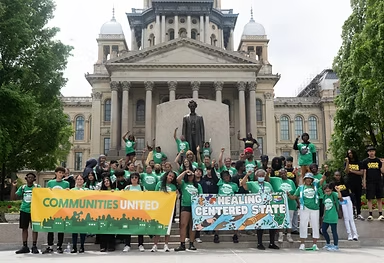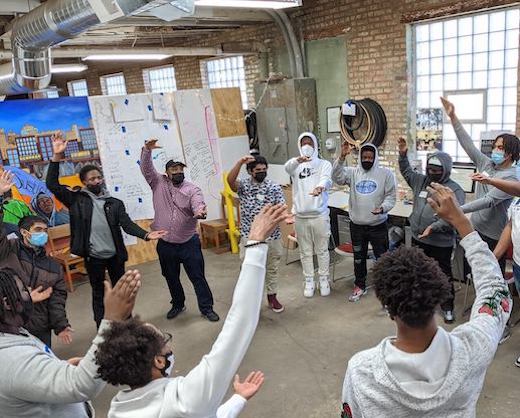Free to Learn and Lead: Communities United
For Youth Justice Action Month, we’re highlighting this story from our Andrus Family Fund partners at Communities United. Read the full story and more in our recent six-year impact report: Journey to Justice.
______
Free to Learn and Lead
When Jenny Arwade and Raul Botello joined Communities United as organizers twenty years ago, they couldn’t have predicted the huge impact the organization would have on their lives and Chicago’s students. Jenny and Raul married several years later and became the organization’s co-executive directors in 2001. As conveners of the Voices of Youth in Chicago Education (VOYCE) alliance, they have been part of a successful youth-led movement transforming what safety means in schools and communities.

Raul recalls that, in 2005, Illinois had some of the highest suspension rates for Black students in the country, especially those with disabilities. Through VOYCE, young people shared stories and research about how harsh school discipline policies excluded them from learning in the classroom. They showed how suspensions and the presence of police in schools disproportionately affected students of color, weren’t making schools any safer, and increased the likelihood of students becoming involved with the juvenile justice system.
Years of advocacy helped lead to a groundbreaking law in Illinois in 2016 that ended harsh school discipline practices. In 2024, movement leaders encouraged the Chicago Board of Education to unanimously vote to remove police from public schools and reinvest over $10 million into holistic, proven approaches to school safety, such as hiring more counselors. Now the lead partner with a Chicago district phasing police out of its schools, Communities United ensures that youth and families who have been harmed by the former system of harsh discipline and policing are the ones defining what that change looks like.
This work is not just about policing. It’s about public health; it’s about education; it’s about wellness; it’s about the sustainability of lives. And if these lives are the next generation, what does it say when we excessively invest in incarceration and policing?
–Raul Botello, co-executive director, Communities United
Though energized by their wins, Jenny and Raul know there is more work to do. Recently, one of the high schools they work with lost two young people to violence within two months. A member of Communities United staff, during his free time, was a victim in a mass shooting and, thankfully, survived.
“It’s impossible to be too excited when we still see that kind of loss that is completely preventable and the direct result of racism and disinvestment in communities,” Jenny says. Still, they remain steadfast in the work, knowing that shifting to community-driven alternatives won’t come unless movement leaders demand and create them.
That’s why Communities United continues to develop grassroots leadership and build organizing power to advance affordable housing, health equity, education justice, youth investment, and immigrant rights, as well as shift resources from the criminal justice and juvenile justice systems into restorative justice alternatives. They’re fortunate that over the years, many of their partners remain in the movement and community.

“It’s powerful to see Communities United youth, parents, and partners lead community alternatives to policing systems—in their schools and neighborhoods,” says Mishi Faruqee, director of the Andrus Family Fund (AFF), a program of the Surdna Foundation. “All children deserve space to learn, live, and grow up without fear.”
AFF gave its first grant to Communities United in 2020, at a time when the country was witnessing how harmful—and fatal—U.S. policing systems could be, particularly for Black communities. Two years later, AFF launched a refreshed grantmaking strategy focused on community organizations building the power of BIPOC youth and families to abolish harmful systems like policing in schools, juvenile prisons, and a child welfare system that separates families instead of investing in them.
According to Raul, “it’s liberatory that folks on the ground can have conversations about visions of community and what they want to see changed. The key is to not let go of the dream of the young people.”
____
The Surdna Foundation’s Board of Directors launched the Andrus Family Fund in January 2000 as a next-generation philanthropy to engage more than 400 extended family members between the ages of 25 and 45 in public service and organized philanthropy. The Andrus Family Fund supports the self-determination, power, and liberation of Black, Brown, AAPI, and Indigenous youth and families impacted by youth incarceration, family policing, and other disruptive systems. Learn more.

